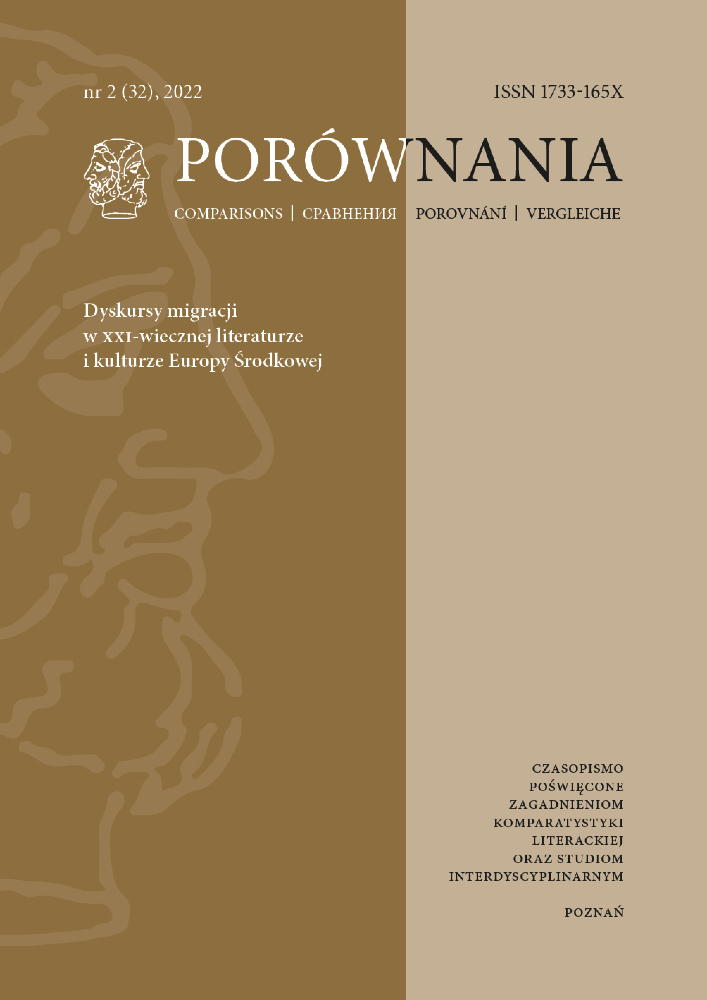Abstract
The article is devoted to the problem of the identity of the main character of Jadwiga Maurer’s stories. She is a Jewish girl survivor of the Holocaust who emigrates to Munich, Germany, after the war. Detailed analyses of Maurer’s short stories, arranged in a kind of cycles, reveal that at the identity level, Holocaust rescue was linked to the source experience of exile. The experience of exile after the war became for the main character of Maurer’s prose a kind of cognitive matrix organizing her experience of reality, as well as setting the axiological framework of existential choices.
References
Bereś Stanisław (1990), Trzy oddechy literatury emigracyjnej, „Kultura” 1990, nr 1–2, s. 141–158.
Elhadary Hoda (2013), Exile and Identity. An Interdisciplinary Approach, Scholar’s Press, Saarbrücken.
Karwowska Bożena (2005), Kategoria wygnania w anglojęzycznych dyskursach krytycznoliterackich. Czesław Miłosz. Josif Brodski, w: Pisarz na emigracji. Mitologie, Style, Strategie przetrwania, red. Hanna Gosk, Andrzej Stanisław Kowalczyk, Dom Wydawniczy Elipsa, Warszawa, s. 79–95.
Karwowska Bożena (2012), Druga płeć na wygnaniu. Doświadczenie migracyjne w opowieści powojennych pisarek polskich, Universitas, Kraków.
Katz Janina (1972), Kronika straconych – Monachium, „Kultura”, nr 6, s. 135–138.
Maurer Jadwiga (2002), Sobowtóry. Opowiadania zebrane, Scriptum, Kielce.
Nasiłowska Anna (2016), Emigracja i migracja, „Teksty Drugie”, nr 3, s. 7–10. DOI: https://doi.org/10.18318/td.2016.3.1 DOI: https://doi.org/10.18318/td.2016.3.1
Olech Barbara (2001), Metafizyka zawieszonego bytu. O opowiadaniach Jadwigi Maurer, w: Cykl literacki w Polsce, red. Krystyna Jakowska, Beata Olech, Katarzyna Sokołowska, Wydawnictwo Uniwersytetu w Białymstoku, Białystok, s. 517–526.
Pasterska Jolanta (2015), Emigrantki, nomadki, wagabundki. Kobiece narracje (e)migracyjne, Wydawnictwo Uniwersytetu Rzeszowskiego, Rzeszów.
Pawlikowski Michał Kryspin (1971), Zadra ocalałych, „Kultura”, nr 6, s. 141–143.
Rostropowicz-Clark Joanna (2002), Holocaust Survivors in Jadwiga Maurer’s Short Stories, „Polin: Studies in Polish Jewry”, t. 15, s. 469–474. DOI: https://doi.org/10.3828/liverpool/9781874774716.003.0029 DOI: https://doi.org/10.3828/liverpool/9781874774716.003.0029
Rostropowicz-Clark Joanna (2012), Opowieści z zatrzymanego czasu. Jadwiga Maurer (1930–2012), „Archiwum Emigracji. Studia – Szkice – Dokumenty”, nr 1–2, s. 341–343. DOI: https://doi.org/10.12775/AE.2012.027 DOI: https://doi.org/10.12775/AE.2012.027
Schultz Deborah (2004), Forced Migration and Involuntary Memory: The Work of Arnold Daghani, w: Cultures of Exile. Images of Displacement, red. Wendy Everett, Peter Wagstaff, Berghahn Books, New York–Oxford, s. 67–86. DOI: https://doi.org/10.2307/j.ctv287sd0z.9 DOI: https://doi.org/10.2307/j.ctv287sd0z.9
Toporska Barbara (1972), List do redakcji, „Kultura”, nr 10, s. 159–160.
Wallace Jennifer (2016), Exile and Emigration: The Pain and Freedom of Not Belonging, w: Literature in Exile: Emigrant’s Fiction 20th Century Experience, red. Irma Ratiani, Cambridge Scholars Publishing, Cambridge, s. 25–35.
Volková Bronislava (2021), Forms of Exile in Jewish Literature and Tought. Twentieth-Century Central Europe and Movement to America, Academic Studies Press, Boston. DOI: https://doi.org/10.1515/9781644694060 DOI: https://doi.org/10.1515/9781644694060
Zeng Hong (2010), E’criture Feminine and The Semiotics of Exile, w: tenże, The Semiotics of Exile in Literature, PALGRAVE MACMILLAN, New York, s. 115–128. DOI: https://doi.org/10.1057/9780230113114_5 DOI: https://doi.org/10.1057/9780230113114_5
License
Copyright (c) 2022 Paweł Panas

This work is licensed under a Creative Commons Attribution-NoDerivatives 4.0 International License.
Utwory opublikowane w czasopiśmie „Porównania”, na platformie Pressto należącej do Uniwersytetu im. Adama Mickiewicza w Poznaniu są udostępniane na licencji Creative Commons Uznanie autorstwa - Bez utworów zależnych 4.0 Międzynarodowe (CC BY-ND 4.0)
Tym samym wszyscy zainteresowani są uprawnieni do korzystania z utworów opublikowanych pod następującymi warunkami:
-
uznania autorstwa — czyli obowiązek podania wraz z rozpowszechnianym utworem informacji o autorstwie, tytule, źródle (odnośniki do oryginalnego utworu, doi) oraz samej licencji
-
bez utworów zależnych — remiksując, przetwarzając lub tworząc na podstawie utworu, nie wolno rozpowszechniać zmodyfikowanych treści.
-
brak dodatkowych ograniczeń — nie można korzystać ze środków prawnych lub technologicznych, które ograniczają innych w korzystaniu z utworu na warunkach określonych w licencji.
Uniwersytet im. Adama Mickiewicza w Poznaniu zachowuje prawo do czasopisma jako całości (układ, forma graficzna, tytuł, projekt okładki, logo itp.).
Autor zachowuje prawa majątkowe, ale udziela zgody Uniwersytetowi im. Adama Mickiewicza w Poznaniu na wykorzystanie dzieła. Autorzy tekstów zakwalifikowanych do publikacji proszeni są o wypełnienie podpisanie i przesłanie umowa (PL) agreement (EN)
Agreement for granting a royalty-free license to works with a commitment to grant a CC sub-license





